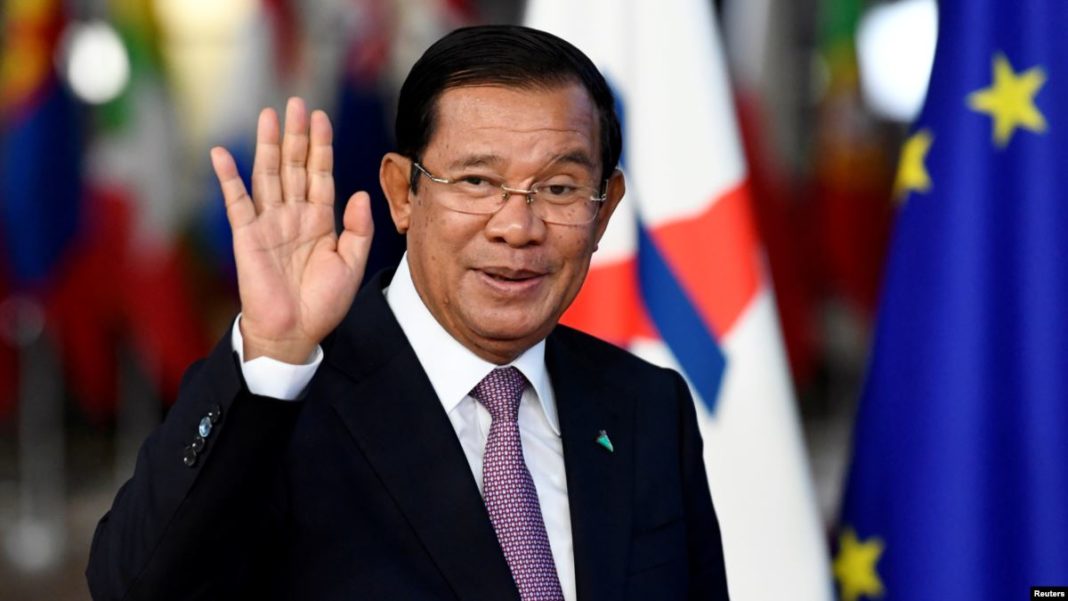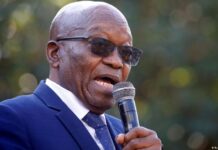Cambodia is preparing for suspension of some its Everything But Arms trade privileges after opposition crackdown.
Cambodia’s government is preparing for the European Union to partially and temporarily remove the country’s Everything But Arms (EBA) trade privileges on Wednesday, in the wake of a 2018 political crackdown.
The EU warned Cambodia last February it would withdraw the scheme unless it made more effort to improve the human rights situation. The deadline for a decision is February 12.
Ministry of Economy and Finance spokesman Meas Soksensan told Al Jazeera that although his ministry had not officially been informed of the decision by the EU, the government was preparing for partial suspension.
“Unofficially we heard … that there must be partial suspension of EBA,” he said.
The European Parliament and Council could still object to any decision, but if approved, it will come into effect on August 12. Both bodies have indicated they want the commission to take a tougher approach to Cambodia’s human rights violations.
If the EU does follow through on its warnings and suspend Cambodia’s EBA arrangements, it would mark the first time it has done so. The EBA entitles 47 countries recognised as least developed by the United Nations to export goods other than weapons to the EU, tariff-free. The bloc has previously withdrawn other preferential trade schemes for Myanmar, Sri Lanka, and Belarus.
“It’s a very early stage to make a judgement. The final result will be coming soon, so any speculation or expectation will … not be encouraged,” Soksensan said. “But I will say that the trade between Cambodia and EU is around [$]4 billion, so we would expect around [$]1 billion to get tariffs on.”
The EBA was thrust into the limelight after the leader of the main opposition Cambodia National Rescue Party, Kem Sokha, was arrested and accused of treason in September 2017 and his party dissolved two months later. Multiple media outlets were also forced to close, and journalists and activists arrested leaving the governing party to take all the seats in Parliament when elections took place in July 2018.
T-shirts could be target
Ben Vanpeperstraete, Lobby and Advocacy Coordinator of Europe-based Clean Clothes Campaign (CCC), told Al Jazeera he was also expecting a partial suspension.
“We do know that the Commission will take the route of partial suspensions,” he said, citing sources with direct knowledge of the draft decision.
This partial suspension, he said, would take the effect of targeting subsectors of the economy, including parts of the garment industry.
While he did not have an exhaustive list of subsectors that would be targeted, he said he was told T-shirts would be included in the new tariff-scheme.
The EU can target specific subsectors by imposing tariffs on “HS4” and “HS6”-levels. Products are grouped in multiple categories, which are then divided further. An HS4 code would include several HS6 sub-sections.
In total, the labour rights expert said, about 25 percent of total Cambodian exports to the EU would be targeted. A partial suspension, Vanpeperstraete said, “does not kill the economy”.
Cambodia mainly exports textiles to the EU, but other significant sectors include rice and bicycles.
According to the European Commission, Cambodia exported five billion Euros (almost $5.5bn) to the EU in 2017, and 5.4 billion Euros ($5.9bn) in 2018. The Ministry of Commerce records exports to the EU at a total of $4.4bn in 2017. The EU is the largest buyer of Cambodian products.
‘Symbolic’
At multiple factories, dozens of garment workers Al Jazeera spoke to had not heard of the impending decision or even the agreement.
At a clothing factory which exports to EU countries making products for brands including Puma, only one garment worker had heard of the agreement. She said management had not informed them of a potential decision and that she had only heard of the agreement through the news.
Chhen Vanna, a food vendor outside a different factory, said she knew about the issue through Facebook. She speculated that some of the workers might be aware of the discussions, but were unwilling to talk. “It’s good for me, I’m old. I’m not afraid. But maybe the young ones are afraid,” she said. “If we lose EBA, our life might be finished.”
Jan Orbie, director of the Centre for EU Studies who researches trade between the EU and developing countries, said partial or full suspension was likely. While having no direct knowledge of the decision that will be issued on Wednesday, he said the European Commission had come under pressure in the trade bloc for not prioritising human rights concerns in its policies.
“The Commission has been blamed for giving priority to free trade over social and democratic concerns. Hence, from the Commission’s perspective, the EBA sanctions could be symbolic in that they signify the EU’s willingness to take social and democracy concerns into consideration through its trade policy,” he said.
Maria Garcia, a senior lecturer at the University of Bath who focuses on EU Trade Policy, agreed, and said withdrawing trade preferences was not only politically-sensitive in the developing countries but also within Europe because individual companies would also be affected.
“Any withdrawal of trading preferences will have impact on both the EU and the partner country,” she said.
“[Even] a relatively insignificant impact for the whole of EU may be impactful for a particular company that imports a product from the affected partner. Politically, it is also a sensitive matter, as withdrawal of preferential access will inevitably create tensions in the relations with the partner country.”
In a document published on the European Parliament’s website, a Member of Parliament noted that the Commission had decided “to withdraw Cambodia’s EBA status on some products”.
The European Commission, meanwhile, remained tight-lipped about its plans.
“Any possible measures will of course be balanced to effectively address the human rights’ violations that triggered the temporary withdrawal procedure, while at the same time preserving the development objective of the Everything But Arms scheme,” a spokesperson told Al Jazeera in an email.
‘Intense poker’
But this partial suspension could be temporary or even prevented altogether.
As Karin Ulmer, senior officer at Europe-based ACT Alliance EU, explained, the EU could repeal its decision before the tariffs took effect, should the Cambodian government make “further progress on civic and political rights”.
This could, she said, avoid major negative effects.
In the draft report compiled following a number offact-finding missions that will serve as a basis for the decision on Wednesday, the European Commission highlighted shortcomings of civil and political rights in Cambodia.
“Despite tangible progress in the areas of land rights and labour rights, the improvements made so far overall … are insufficient to change the overall assessment of serious and systematic violations,” the report, seen by Al Jazeera, reads.
Looking at political rights, for example, the Commission alleged that “to date, the Commission has no found evidence that Cambodia has adopted the necessary measures to remedy these violations.”
The government has rejected criticism, saying it had acted in accordance with Cambodian law.
Vanpeperstraete said a lot depended on the Cambodian government’s moves over the next few months.
Since the EU has announced its intention to withdraw the agreement, the Cambodian government has seemingly given some concessions by for example releasing opposition leader Kem Sokha out of house arrest.
But after then-acting President of the CNRP Sam Rainsy announced his return to Cambodia, authorities arrested almost 100 supporters of the opposition party on allegations of plotting a coup against the government. Most have been released since, but charges against them remain.
“Between February and August we will see some intense poker between the EU, Cambodia and also US. A lot will depend on whether the Government of Cambodia proposes and implements convincing and sustainable steps forward, and how impressed the rest are,” he said.













![Hotstar Premium Cookies 2019 [*100% Working & Daily Updated*] Hotstar Premium Cookies 2019 [*100% Working & Daily Updated*]](https://tahav.com/wp-content/uploads/2019/11/Hotstar-Premium-Cookies-Free-100x70.jpg)



